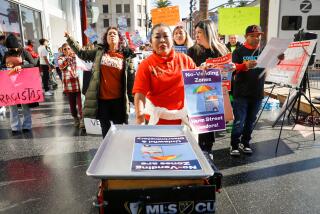Alarcon in Quandary Over Street Vendor Legalization
- Share via
As City Hall prepares again to grapple with the thorny issue of legalizing street vendors, Los Angeles City Councilman Richard Alarcon finds himself in the eye of a storm.
His own Valley-based district is 70% Latino and many of his constituents patronize the growing number of vendors in Pacoima, Van Nuys, Panorama City and Sylmar.
But homeowners and business people in his district, many of whom supported his successful election effort, see vending as a harbinger of urban decay.
Today, the council’s Public Works Committee is scheduled to hold a hearing on a proposed street vending law.
Alarcon is chairman of that committee.
The 39-year-old councilman is handling the vending issue with care as befits a lawmaker who, on the campaign trail last spring, found East San Fernando Valley voters anxious about pushcart merchandising.
“It was one of the most consistent concerns I heard,” Alarcon said. “People were saying, ‘We’re losing control of our streets, with crime and street vending.’ ”
An aide to one Valley council member, who asked for anonymity, reported that his office has gotten more than 100 calls in the past two months complaining about street vendors.
During last spring’s mayoral campaign, candidate Michael Woo quietly dodged a showdown on his own plan to legalize street vending, apparently fearing publicity would damage his appeal to suburban voters.
What Alarcon must attempt to do is balance the imperative to legitimize and control an emerging Latino business phenomenon with the demands of existing homeowner and business interests seeking to protect their neighborhoods and competitive edge in a tough economy.
Alarcon himself is torn on the issue.
“I’m not completely comfortable with the ordinance as it is now written,” he said. “But if it can be adjusted, I’d support it.”
A measure, introduced by Woo, legalizing street vending was tentatively approved on an 11-3 vote in January, 1992, by the City Council.
But the measure languished for the next 21 months in the city attorney’s office awaiting the formal drafting of legal language before going to the council for a final vote.
The proposal, as now written, calls for establishing a complicated process that could eventually result in the creation of four special districts in the city where street vending would be legal for certified vendors, who abide by certain health and safety standards.
During his own election campaign earlier this year, Alarcon promised he would “not run away” from the street vending controversy while giving few indications of where he stood on the issue except that he supported some legalization program.
Alarcon’s predecessor, Ernani Bernardi, had vociferously opposed the vending ordinance, calling its passage in concept in 1992 a “gigantic horrible step backward.”
In a recent interview, Alarcon said he has several problems with the draft ordinance, including a provision that allows only 10% of the property owners in an area to initiate the process to create a special street vending district where pushcart sales would be legal.
“I don’t want 10% of any group deciding anything in my district,” Alarcon said.
Alarcon also said he is worried that the initial investment required of vendors entering the program might be prohibitively high, thus leaving many vendors with no alternative but to continue plying their trade illegally.
City officials have estimated that the start-up cost to vendors will be $2,400.
The costs will include those of obtaining licenses, paying fees and of buying an approved pushcart--one designed to meet health standards.
“Quite frankly I don’t think the average street vendor will be able to afford joining the program,” Alarcon said.
Alarcon acknowledged that the districts would be too small to accommodate all the estimated 5,000 street vendors in the city.
The misdemeanor law against street vending should continue to be enforced against these vendors, Alarcon said.
However, the lawmaker did not propose any stepped-up program of enforcement to discourage illegal vending.
“That’s just not part of my focus,” Alarcon said.
Late Tuesday, some representatives of the city’s downtown business community and a coalition of street vendor activists appeared to have reached a compromise on some of issues that have sharply divided them in the past.
In a letter sent to Alarcon, the groups recommended the creation of eight vending districts--not four, as is now contemplated--throughout the city; raising to 20% the number of property owner signatures needed to initiate the process for creating the districts, and the creation of citizen committees, including vendors, local council members and existing businesses, to advise the city on proposals to create a vending district.
Carol Schatz, vice president of the Central City Assn., speculated that the compromise agreement between downtown business community interests and the vendors provides a framework that may make it easier for Alarcon and his committee to reach their own decisions about what final step to take.
“With the these proposed changes, the business organizations have agreed to support the proposed Street Vending Ordinance in its entirety,” according to a press release accompanying the announcement.
The compromise agreement was also signed by Genny Alberts from the Blythe Street Renaissance, a group of Valley-based street vendors.
Alberts said Tuesday that her group is looking to have one of the districts located in the Valley.
“If there were only four districts, that wouldn’t be enough to go around,” Alberts said in an interview.
The City Council in August approved a $250,000 grant to train street vendors in the Blythe Street area on how to operate under the health and business regulations that would prevail if the vending ordinance is passed.
More to Read
Sign up for Essential California
The most important California stories and recommendations in your inbox every morning.
You may occasionally receive promotional content from the Los Angeles Times.













